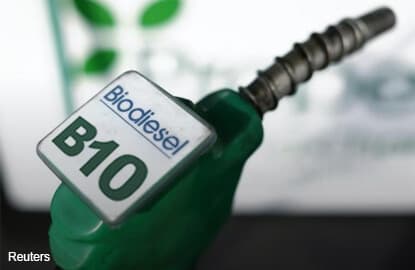
THE federal government is understood to have scrapped its plan to implement the B10 biodiesel mandate for use as diesel fuel in the transport sector, sources familiar with the matter tell The Edge.
The initial plan was to implement it in June this year but that was pushed to the fourth quarter of the year. The year ends soon and the authorities have not revealed the latest move on this.
In mid November, Plantation Industries and Commodities Minister Datuk Seri Mah Siew Keong said that “after a thorough study, taking into consideration the difference between crude palm oil (CPO) and diesel prices in the current volatile market, I would like to announce that the implementation of the biodiesel mandate for B10 in transport and B7 in the industrial sector will be deferred to a late date”.
In a brief conversation with The Edge last week, Mah said his earlier comments still stand. However, industry observers maintain that the mandate has been scrapped.
It is learnt that the plan for the B10 blend — made up of 10% palm methyl ester and 90% petroleum diesel — has been scrapped as the CPO price has strengthened over the past few months, which would make B10 not commercially viable. The current B7 is a petroleum diesel blend comprising 7% palm methyl ester.
“Basically, we missed the window (to implement B10). CPO prices have gained about 40% over the past few months [which] renders the whole B10 exercise for diesel lorries useless,” a source familiar with the matter says.
Another automotive industry source says, “We are very opposed to it. I am glad it’s being scrapped.”
CPO prices came off a low of RM2,214 per tonne on Dec 17 last year. The downward trend was reversed and the edible oil price has gained more than 40% since July, to tread at about RM3,140 per tonne at press time.
According to analysts, next year could be better for CPO. MIDF Amanah Investment Bank Bhd raised its average price assumption for the edible oil for 2017 to RM2,725 per tonne from RM2,450 previously, buoyed by a strong US dollar and lower palm oil stockpile in the first quarter of 2017, among others.
MIDF also sees Malaysia’s palm oil stockpile dipping below the critical 1.5 million tonnes towards the first quarter of 2017.
Mah was appointed in June this year, a month before CPO prices started running, and it is unlikely he could have implemented anything in such a short time.That is why the source refers to him as having “missed the window” of opportunity to implement B10 biodiesel.
In June this year — when the B10 biodiesel programme was to be implemented, the Malaysian Automotive Association (MAA) had said that diesel vehicle owners were not ready for it and preferred the B7 blend, largely because there was much uncertainty with B10, especially with regard to engine warranty and its long-term effects on diesel engines.
Initially, B10 was forecast to increase palm oil usage in Malaysia by 750,000 tonnes annually, help reduce the high palm oil stock and nudge prices upwards.
Malaysia is forecast to produce about 20 million tonnes of CPO this year, up from 17.7 million tonnes last year.
Many automotive principals have told their Malaysian dealers and representatives that warranties could not be granted for vehicles using more than 7% palm methyl ester, or B7.
The MAA was also said to have sought assistance from the Malaysia Automotive Institute — as an independent organisation under the Ministry of International Trade and Industry — while it compiled feedback from its members to strengthen its case.
The implementation of B10 biodiesel this year was unpopular as vehicle sales had already taken a beating and the ruling, due to the uncertainties involved, could make things worse.
For the first 10 months of the year ended Oct 30, total industry volume was 466,208 units, down 13.87% from 541,277 for the previous corresponding period. Commercial vehicle sales for the first 10 months of the year, at 52,815, were down 12.54% from 60,389 for the same period last year.
Another issue brought up by automotive players is that B7 was only introduced to the market a year ago, in December 2015, which means that the effects of long-term use of B7 are still unknown.
However, according to Global Agricultural Information Network (Gain) reports,95% of all vehicles on the road in the US today are approved up to B20.
The Gain report released in end-July this year also highlights that although Malaysia’s initial plan was to initiate B5 in 2008, it only began on June 1, 2011, and full nationwide implementation in Peninsular Malaysia and Sabah and Sarawak was achieved at end-2014. It seems a delay in implementing B10 would not be surprising.
Until September, there had been positive indications that B10 would be implemented by the end of this year.
Save by subscribing to us for your print and/or digital copy.
P/S: The Edge is also available on Apple's AppStore and Androids' Google Play.